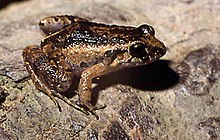Adenomera andreae
| Adenomera andreae | |
|---|---|
 |
|
| Scientific classification | |
| Kingdom: | Animalia |
| Phylum: | Chordata |
| Class: | Amphibia |
| Order: | Anura |
| Family: | Leptodactylidae |
| Genus: | Adenomera |
| Species: | A. andreae |
| Binomial name | |
|
Adenomera andreae (Müller, 1923) |
|
| Synonyms | |
|
Leptodactylus andreae Müller, 1923 |
|
Leptodactylus andreae Müller, 1923
Adenomera andreae (common name: lowland tropical bullfrog) is a species of frog in the Leptodactylidae family. It is found in the lowlands of northern South America east of the Andes (Bolivia, Brazil, Colombia, Ecuador, French Guiana, Guyana, Peru, Suriname, and Venezuela). As currently defined, it probably represents a cryptic species complex, comprising perhaps four species.
Adenomera andreae are small frogs, usually less than 30 mm (1.2 in) in adult body length. Dorsum is grayish brown to beige, occasionally with dark brown spots, and rarely with a vertebral dark brown stripe and/or dorsolateral orangish yellow stripe. The ventral surfaces are white. Iris is chestnut.
Eggs are laid in foam nests on the ground.Tadpoles are terrestrial: they are endotrophic and develop in the nest. Recruitment of juveniles is synchronized with rainfall.
Its natural habitats are tropical moist lowland forests, but it can also be found in open environments such as grasslands surrounded by forest habitats. It is threatened by habitat loss from clear cutting.
...
Wikipedia

